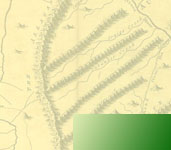Field Schools
2013 Field School - Download PDF version
University of Tennessee, Knoxville 2014 Archaeological Field School At Indian Camp Quarter, Ballsville,Virginia
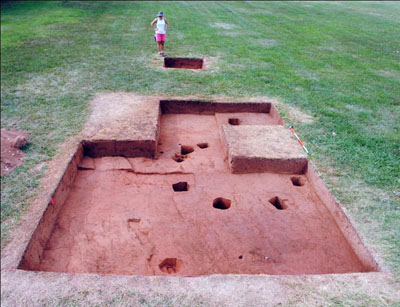 Indian Camp was part of a 2400-acre plantation established about 1730 by planter Francis Eppes. The property was divided between his daughters,
Indian Camp was part of a 2400-acre plantation established about 1730 by planter Francis Eppes. The property was divided between his daughters,
Ann and Martha, with each receiving 1200 acres upon his death. Indian Camp was also home to a community of enslaved Africans and African Americans who lived and worked there from about 1730 until the 1770s. In 1774, Thomas Jefferson inherited the property, and shortly thereafter, began moving enslaved individuals and families west to work at his Poplar Forest plantation in Bedford County, near the Blue Ridge mountains. By the 1790s, owner Francis Eppes Harris was operating a store and tavern on the property. Excavations on the property have discovered a domestic site and several outbuildings likely dating from 1770 to 1820, encompassing both the plantation and the tavern periods.
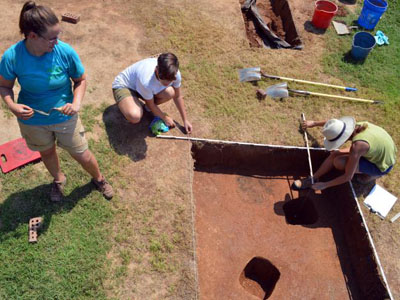 Indian Camp lies between the James and Appomattox Rivers and is approximately 40 miles west of Richmond, Virginia. It is currently divided between a number of private owners with the original mansion and core of the site listed on the National Register of Historic Places.
Indian Camp lies between the James and Appomattox Rivers and is approximately 40 miles west of Richmond, Virginia. It is currently divided between a number of private owners with the original mansion and core of the site listed on the National Register of Historic Places.
Excavations at Indian Camp, supported by a four-year grant from the National Endowment for the Humanities, are part of a long-term study that aims to:
- Understand the development of slavery in the Virginia piedmont,
- Trace diverse experiences and histories of the communities that lived and worked at the site. We will look at material culture, family formation and kinship networks, and economic activities.
- Contribute to a growing comparative archaeological database on New World slavery, online at www.daacs.org.
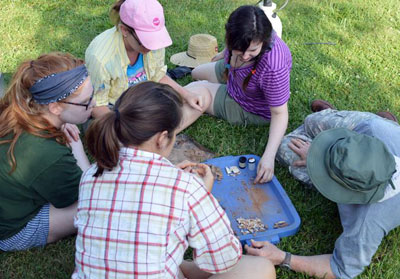 During 2014, we will continue excavations at 44PO157, a site that includes the remains
of a mid-to-late 18th –century slave quarter
and features likely related to the adjacent early 19th-century tavern. Students will learn
During 2014, we will continue excavations at 44PO157, a site that includes the remains
of a mid-to-late 18th –century slave quarter
and features likely related to the adjacent early 19th-century tavern. Students will learn
skills relating to site survey (including use of a total station), stratigraphic excavation, mapping, record keeping, and artifact identification. Students will work in the field approximately 8 hours per day, Monday-Friday during this period. We will also take field trips to other archaeological sites in the area.
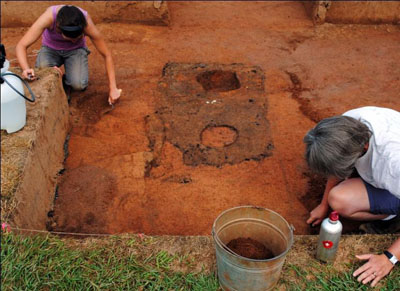 Dates, Credits, Costs, and Logistics:
Dates, Credits, Costs, and Logistics:
Dates:
- May 16-June 20
Credits:
- 6 hours of undergraduate (Anthropology 430)
or graduate credit (Anthropology 530).
You must be enrolled as a UT student to take this course. People who are not currently enrolled at UT can participate by following the instructions under "Visiting Students" at http://admissions.utk.edu/undergraduate/applications/AdmApp10.pdf (undergraduate) or following the instructions for "transient admission" at http://admissions.utk.edu/graduate/req.shtml#Trans (graduate).
Tuition and Other Costs:
Tuition for 6 hours of credit will be:
| In-state | Out of state | |
| Undergraduate* | 2478.00 | 7134.00 |
| Graduate* | 3588.00 | 9756.00 |
*based on current posted fees for 2013-2014 academic year. Cost subject to change when
summer 2014 charges are posted.
Additional costs include:
- Class fee: $75 (covers procedures manual and field and lab costs and supplies)
- Housing plans have not been finalized, but costs will run about $30/night.
Payment for housing is due separately from tuition.
Students are responsible for arranging their own transportation to Virginia and to and
from the site each day, and for the cost of all meals and incidental expenses.
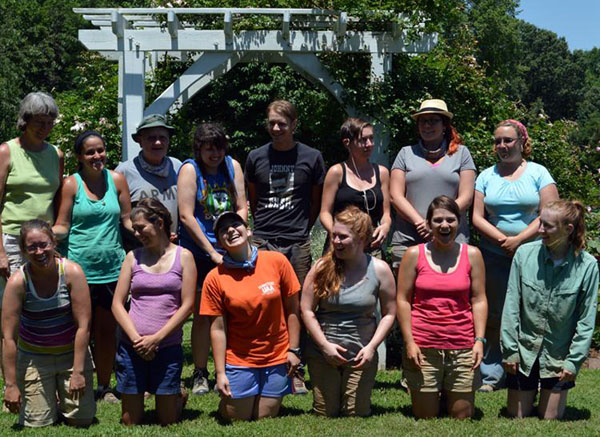
To Apply:
Please contact Dr. Barbara Heath (974-1098; bheath2 @utk.edu) and provide the following information.
-
Personal information: full name, home address, phone number and email address
-
One page letter stating your reasons for participating in this class and reviewing any prior archaeological experience (although prior experience is not necessary to participate).
-
A doctor’s statement showing good physical health (due before the start of field work).

